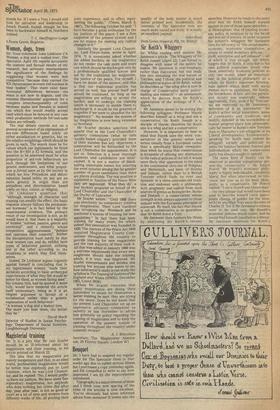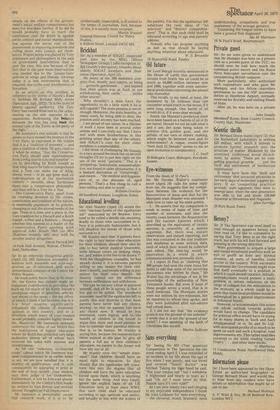Sir Keith's Whiggery
Sir: Whilst reading with interest Mr Jamieson's article: 'The Whiggery of Sir Keith Joseph' (April 12), I am forced to disagree with some of the points he makes. Mr Jamieson is over-emphatic rather than inaccurate, but this leads him into mistaking the true nature of Toryism, and, I think, the political and philosophical stance of Sir Keith, whom he describes as "the whig who is now in charge of Conservative party policymaking and research"— an assessment which he derives from Sir Keith's appreciation of the writings of F. A. Hayek.
Mr Jamieson seems to be stating the following syllogism: Professor Hayek describes himself as a whig and not a conservative; Sir Keith Joseph is a disciple of Hayek; therefore Sir Keith also is a whig and not a conservative.
However, it is important to bear in mind that Hayek uses the word 'conservative' in the generic sense and writes usually from a European rather than a specifically British viewpoint; thus When he states that conservatism is incapable of offering any alternative to the radical policies of the left it would seem likely that uppermost to his mind is the continental ultra-ism of Polignac and Metternich, and later, of Horthy and Salazar, rather than to a British Toryism which finds its root and dynamic in a three-centuries-old tradition and endowed with a philosophy both pragmatic and radical from such sources of genius as Bolingbroke. Burke and Disraeli — a conservatism whose strength is not always apparent to those imbued with the European principles of statecraft. By itself, the fact that Hayek is not a conservative is no guarantee that Sir Keith is not a Tory.
Mr Jamieson then furthers his thesis by analysing Sir Keith's recent speeches. However he tends to the same error that Sir Keith himself warned against in one of those same speeches — at Birmingham: that of treating economic policy in isolation or as the be-all and end-all of politics. In order to prove his subject's whiggery Mr Jamieson cites his advocacy of "the social market economy, economic competition, a return to sound monetary policies . . thrift, enterprise and self-reliance" — all of which is true enough, but which forgets that Sir Keith, if only due to his own political scepticism, would view these essentially economic policies as only one strand, albeit an important one, in his political philosophy as a whole. Sir Keith's important Birmingham speech which dealt with social themes such as patriotism, the family, the breakdown of law, and the permissive society was essentially, almost aggressively, Tory, even if by 'Toryism' we are restricted to Mr Jamieson's definition of it as `paternalist.' Sir Keith's active social conscience, sense of community and tradition, and healthy disbelief in the inevitability of human progress place him philosophically far nearer to Burke's new Toryism than to Macauley's old whiggism or its Liberal developments. Economically. speaking Sir Keith may indeed be whiggish: socially and politically he seeks the balance between Statism and Individualism which the conservative party has always sought to uphold. The same kind of duality can be observed in another conspicuous present-day conservative — Mr Enoch Powell. Mr Powell's economic philosophy is highly individualist, classically liberal. But when interviewed on television last year as to his basic philosophy as a conservative, Mr Powell replied: "I am a church and Queen man" — the very phrase that would have been used to describe himself (with appropriate change of gender for the monarch) by any High Tory since the time of Charles II. Yet if Mr Jamieson's criteria were to be used only Mr Powell's economic policies would count, and he would find himself classified as a liberal: Mr Jamieson mentions Sir Keith's
attack on the effects of the government's social welfare commitments but does not elucidate further. If he did he would probably have to reach the conclusion that Sir Keith is against social control and social manipulation, not against the social role of the government in improving standards and aiding those who cannot aid themselves. If more stress was placed by Tory statesmen and philosophers in the past on government intervention than is now the case, this was because of the fact that in the past more intervention was needed due to the laissez-faire' policies of whigs and liberals; whereas today it is less intervention that is required, due to the over interference of Socialism.
In an article on this problem in reference to the theme of Hayek's Road to Serfdom Mr Richard Body wrote (Spectator, July, 1972): "It is the story of
• liberty against authority. The Tory Party has veered from one to the other, leaning on the side opposite to its opponents. Redressing the balance between the two has long been the eternal task of the Tories as the party of the right."
Mr Jamieson's real mistake is that he seems to have missed the essence of the Tory Party as expressed in the truism that it is a 'coalition of interests' — and also a coalition of ideas. He gets close to it when he writes: "that the Conservative Party should seek replenishment from a whig source is no real surprise" — yet by describing Sir Keith Joseph as that whig source he fails to comprehend that a Tory can make use of whig, liberal, even — in an age gone mad on individualism as in the nineteenth century — socialist, ideas, harmonise them into a conservative philosophy and thus still be a Tory for a' that.
The Conservative Party, apart from its overiding devotion to the crown, constitution and tradition of the nation, is essentially prgamatic in its policies, changing to suit the altered needs of the age. There is a time and a place in the Tory tradition for a Disraeli and a Keith Joseph, a Peel and a Baldwin — though whether this extends to a leader of the Conservative Party quoting with approval John Stuart Mill (as Mrs Thatcher recently did) may well be another matter altogether.
David Patrick Hill
14 Park Hall Avenue, Walton, Chesterfield, Derbyshire Sir: In an otherwise thoughtful article (April 12), Bill Jamieson attempted to buttress with innuendo and auto-suggestion an ill-informed and quite unwarranted criticism of the Centre for Policy Studies. He must surely know that, in its short life, the Centre has already made an important contribution in providing the back-up for much of Sir Keith Joseph's prodigious output of speeches, articles and letters to the press — the net effect of which, I think it fair to claim, has in a few brief months significantly influenced the climate of economic opinion in this country, and in a direction which many of your readers would probably consider highly desira ble. Moreover, Mr Jamieson seriously underrates the value of our forays into the institutions of higher education where Sir Keith has attracted very large audiences almost all of whom have received his talks with interest and attentiveness.
As for our "nebulous, cyclostyled credo" (about which Mr Jamieson was most complimentary in an earlier letter to us), we are now satisfied that it is worthy of publication and it will consequently be appearing in print at the end of next month; your readers may then judge it for themselves. Furthermore, it will be followed almost immediately by the Centre's first booklet, written by Sam Brittan and entitled Second Thoughts on Full Empoyment.
Mr Jamieson is presumably aware that research work, if it is to be intellectually respectable, is ill-suited to the tempo of journalism, And, because of this, it is usually more accurate.
Martin Wessell
General Director Centre for Policy Studies.
8 Wilfred Street, London SWIE 6PL











































 Previous page
Previous page